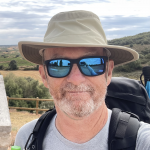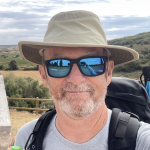In the autumn of last year, as I walked the ancient path of the Camino de Santiago, I nurtured a profound realization, a concept I have come to call GIMO - Gratitude In Missing Out. Like a seed this realization was sown upon me during one of the most impactful experiences of my life: the passing of my father.
My journey on the Camino took an unexpected turn when I received the news of my father's death just outside Castrojeriz. I wrote about it here. Faced with the decision to return home for his funeral or continue my pilgrimage, I chose the latter. This decision, laden with initial guilt and a sense of anticipated FOMO (Fear Of Missing Out) or maybe it would be better to call it Guilt In Missing Out , gradually unfolded into a deeply meaningful experience that encapsulated the essence of my new approach to decision making and living a good life, the search for Gratitude in Missing out.
As I walked, my siblings back in Oregon came together to care for my father’s belongings, organize his funeral, and lay him to rest. Despite the physical distance, they kept me connected through family Zoom meetings, emails, and texts. They streamed the funeral service, allowing me to hear from afar in a hotel room in Via Franca del Bierzo. This act of inclusion provided a sense of presence in absence for me, a bridge between the contemplative walk I had just made across the Meseta and my family's collective mourning back home.
Through this experience, I found a profound sense of gratitude in the path I chose - a path that allowed me to walk with my father in spirit across the vast stretches of the Meseta. This choice, while initially laden with a sense of loss for what I was missing, transformed into a unique communion with my father's memory, offering a reflective and intimate experience I would not have had, had I returned to Oregon.
I came to understand this personal journey contemplating George Kelly's Personal Construct Theory (PCT), which emphasizes how we individually construct our realities. Finding Gratitude In Missing Out, in this light, is not merely about passively avoiding; it's an active choice to appreciate and find meaning in the distinctive paths we tread, even, and especially, in the face of loss and the fear of missing alternative possibilities.
My new concept of GIMO thus is not only a theoretical idea but I have lived the experience. It's about embracing the beauty and lessons of difficult choices, finding peace in our decisions, and recognizing the profound growth that can come from what we choose not to do or have. In my walk across the Meseta, I learned that sometimes, the paths we choose not to take can lead to the deepest insights and most meaningful experiences.
In conclusion, GIMO can be a subtle yet powerful approach in life, and help us make peace with our past decisions, especially those we might be looking upon with regret. It teaches us to find gratitude in our choices and their consequences, even when they involve missing out on significant life events. This perspective is not about disregarding the value of presence, but about understanding and cherishing the unique opportunities that come with every decision we make. Saying yes to something means we are naturally saying no to many other things. My experience on the Camino de Santiago, walking with my father in spirit, embodies the essence of GIMO – a profound gratitude for the journey, with all its absences and presences.
¡Viva la Meseta!
Lance v22.036


